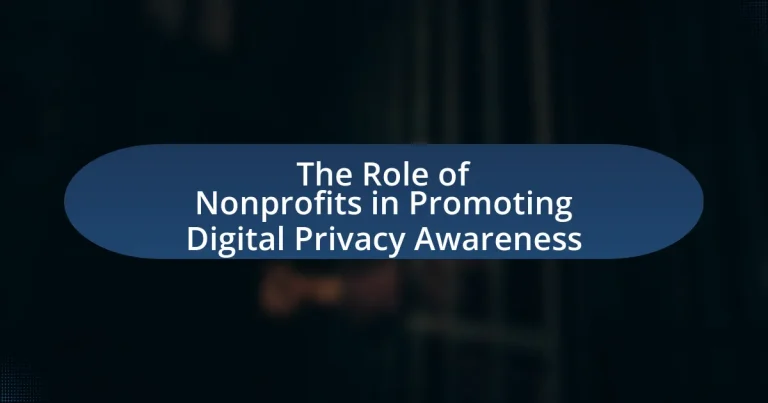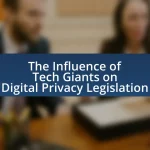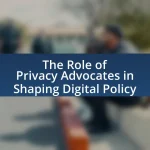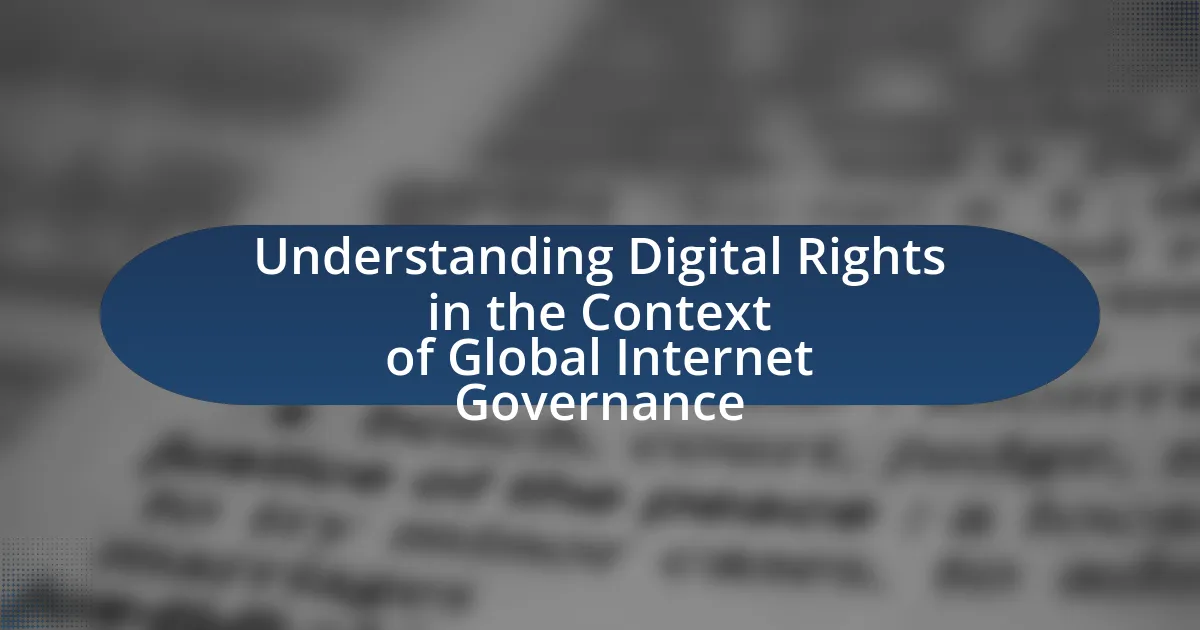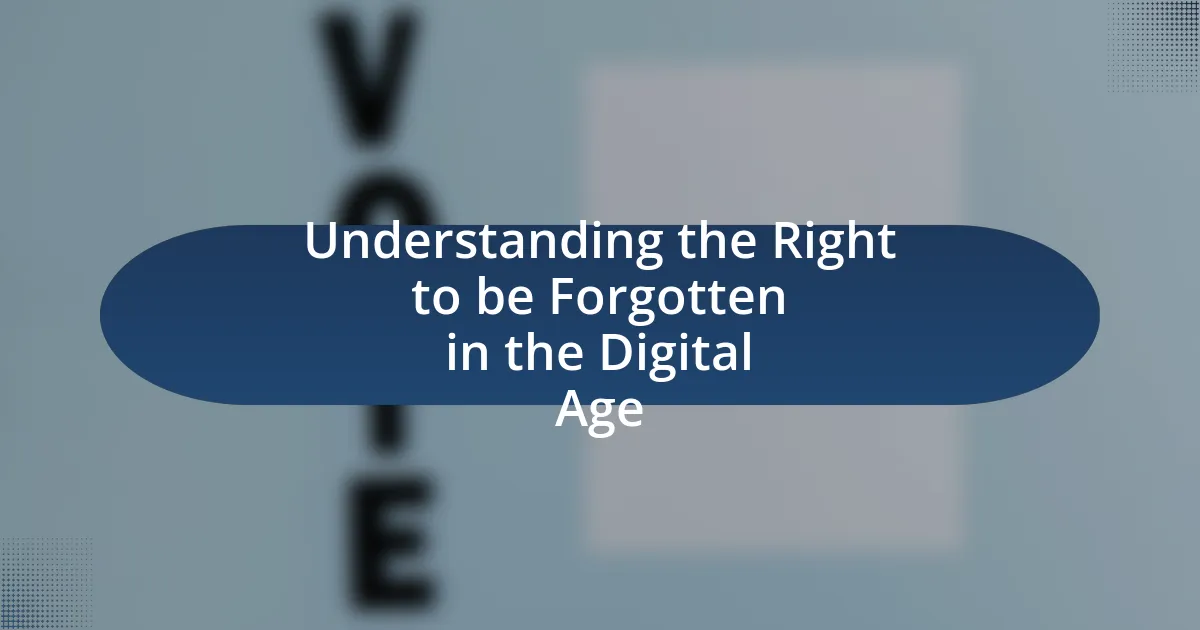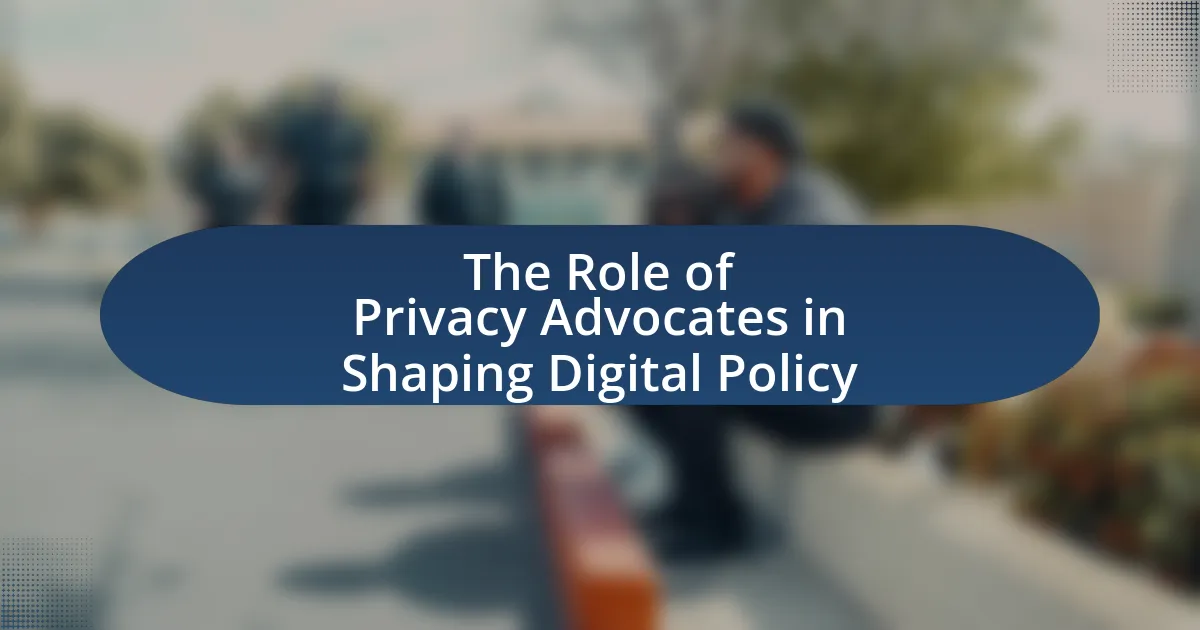Nonprofits play a vital role in promoting digital privacy awareness by educating the public about data protection rights and advocating for stronger privacy regulations. They implement various programs, such as workshops and online resources, to empower individuals with knowledge about safeguarding personal information. Collaborations with policymakers and other organizations enhance their advocacy efforts, while challenges like funding limitations and misinformation hinder their initiatives. The article explores the strategies nonprofits use to engage communities, the importance of digital privacy awareness, and the future trends in nonprofit efforts to address emerging privacy issues.
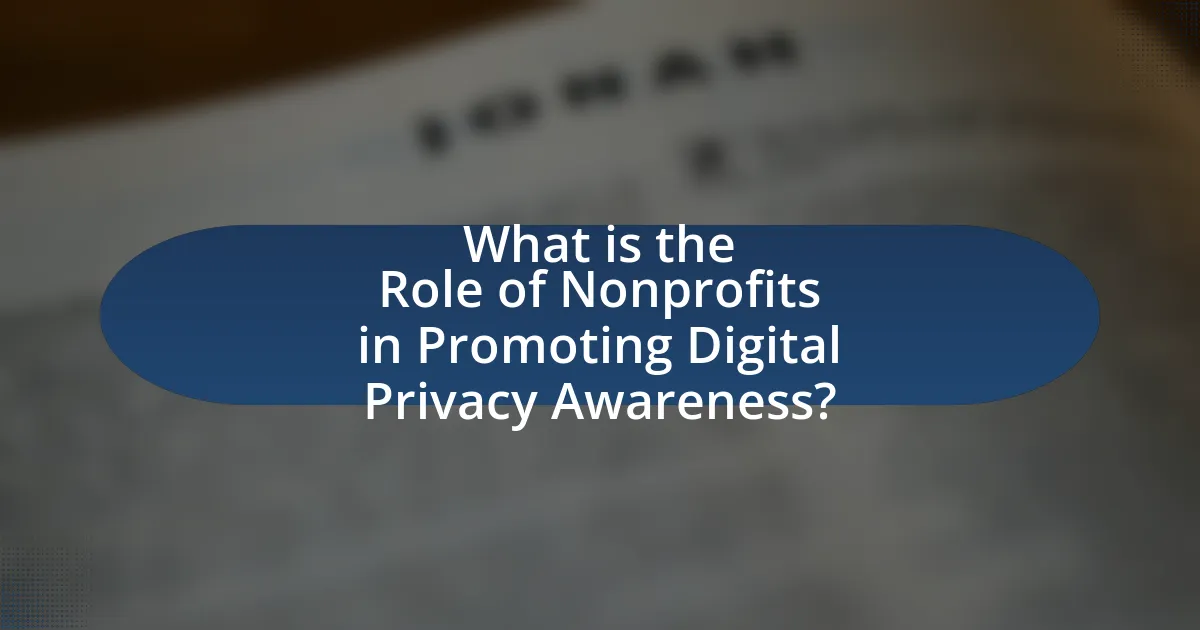
What is the Role of Nonprofits in Promoting Digital Privacy Awareness?
Nonprofits play a crucial role in promoting digital privacy awareness by educating the public about data protection rights and advocating for stronger privacy regulations. These organizations often conduct workshops, create informative resources, and engage in community outreach to raise awareness about the importance of safeguarding personal information. For instance, the Electronic Frontier Foundation (EFF) provides extensive resources on digital privacy issues, helping individuals understand their rights and the implications of data misuse. Additionally, nonprofits frequently collaborate with policymakers to influence legislation that enhances privacy protections, thereby ensuring that the public’s interests are represented in the digital landscape.
How do nonprofits contribute to digital privacy education?
Nonprofits contribute to digital privacy education by providing resources, training, and advocacy to raise awareness about privacy issues. Organizations like the Electronic Frontier Foundation and Privacy Rights Clearinghouse offer workshops, online courses, and informational materials that educate individuals on protecting their personal data. Additionally, nonprofits often engage in policy advocacy, influencing legislation to enhance privacy protections. For example, the Center for Democracy & Technology has been instrumental in shaping privacy laws in the U.S. through its research and public campaigns. These efforts collectively empower individuals with the knowledge and tools necessary to navigate the digital landscape safely.
What specific programs do nonprofits implement for digital privacy awareness?
Nonprofits implement various specific programs for digital privacy awareness, including educational workshops, online resources, and advocacy campaigns. For instance, organizations like the Electronic Frontier Foundation (EFF) provide resources and training sessions focused on digital rights and privacy protection. Additionally, the Privacy Rights Clearinghouse offers guides and tools to help individuals understand their privacy rights and how to protect their personal information online. These programs aim to empower individuals with knowledge and practical skills to navigate digital privacy challenges effectively.
How do nonprofits collaborate with other organizations to enhance digital privacy education?
Nonprofits collaborate with other organizations to enhance digital privacy education by forming partnerships that leverage resources, expertise, and outreach capabilities. For instance, nonprofits often work with educational institutions to develop curricula focused on digital privacy, ensuring that students receive up-to-date information on best practices. Additionally, collaborations with technology companies can provide nonprofits access to tools and platforms that facilitate workshops and training sessions, thereby reaching a broader audience. Research indicates that such partnerships can significantly increase the effectiveness of educational initiatives; for example, a study by the National Cyber Security Alliance found that community-based programs involving multiple stakeholders improved participants’ understanding of digital privacy by 40%.
Why is digital privacy awareness important in today’s society?
Digital privacy awareness is crucial in today’s society because it empowers individuals to protect their personal information from misuse and exploitation. With the rise of data breaches and cyber threats, statistics indicate that over 4.1 billion records were exposed in data breaches in 2019 alone, highlighting the vulnerability of personal data. Increased awareness helps individuals understand the risks associated with sharing information online and encourages them to adopt safer practices, such as using strong passwords and enabling two-factor authentication. Furthermore, informed citizens can advocate for stronger privacy regulations, ensuring that organizations are held accountable for safeguarding user data.
What are the risks associated with a lack of digital privacy awareness?
A lack of digital privacy awareness exposes individuals and organizations to significant risks, including identity theft, data breaches, and unauthorized surveillance. Without understanding the importance of protecting personal information, individuals may inadvertently share sensitive data, making it easier for cybercriminals to exploit this information. For instance, according to the Identity Theft Resource Center, there were over 1,100 data breaches reported in the United States in 2020, affecting millions of individuals. Additionally, the absence of digital privacy awareness can lead to a false sense of security, resulting in inadequate protective measures against phishing attacks and malware. This lack of vigilance can further compromise personal and financial information, leading to severe financial losses and reputational damage.
How does digital privacy impact individuals and communities?
Digital privacy significantly impacts individuals and communities by safeguarding personal information and fostering trust in digital interactions. When individuals have control over their data, they are more likely to engage in online activities, which can enhance community participation and collaboration. For instance, a study by the Pew Research Center found that 81% of Americans feel they have little to no control over the data collected about them, leading to decreased online engagement and a sense of vulnerability. This lack of privacy can result in communities becoming less cohesive, as individuals may withdraw from sharing information or participating in communal activities due to fear of surveillance or data misuse. Therefore, promoting digital privacy is essential for empowering individuals and strengthening community bonds.
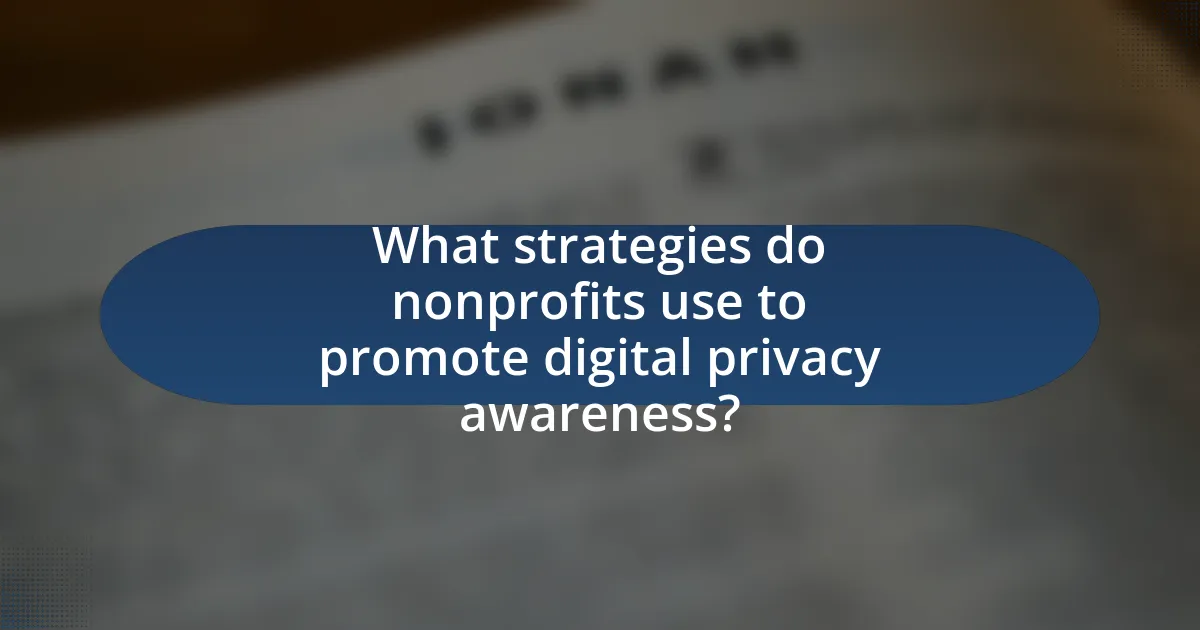
What strategies do nonprofits use to promote digital privacy awareness?
Nonprofits promote digital privacy awareness through educational campaigns, community workshops, and partnerships with technology organizations. These strategies aim to inform the public about the importance of protecting personal information online. For instance, organizations like the Electronic Frontier Foundation conduct outreach programs that provide resources and training on digital security practices. Additionally, nonprofits often leverage social media platforms to disseminate information quickly and engage with a broader audience, enhancing public understanding of privacy issues. Research indicates that educational initiatives can significantly increase awareness and knowledge about digital privacy, as evidenced by surveys showing improved understanding among participants after attending nonprofit-led workshops.
How do nonprofits engage with the community to raise awareness?
Nonprofits engage with the community to raise awareness by organizing educational workshops and outreach programs focused on digital privacy issues. These initiatives often include collaboration with local schools, community centers, and online platforms to disseminate information effectively. For instance, a study by the Pew Research Center found that 70% of participants reported increased awareness of digital privacy after attending nonprofit-led workshops. This demonstrates that direct engagement through interactive sessions significantly enhances community understanding of digital privacy concerns.
What outreach methods are most effective for nonprofits in promoting digital privacy?
Effective outreach methods for nonprofits in promoting digital privacy include educational workshops, social media campaigns, and partnerships with tech companies. Educational workshops provide hands-on training and resources, enabling participants to understand digital privacy risks and protective measures. Social media campaigns leverage platforms like Twitter and Facebook to disseminate information quickly and engage a broader audience, as evidenced by the success of campaigns like Data Privacy Day, which raises awareness globally. Partnerships with tech companies can enhance credibility and provide access to advanced tools and resources, exemplified by collaborations between nonprofits and organizations like the Electronic Frontier Foundation, which amplify messages about digital rights and privacy.
How do nonprofits utilize social media to spread digital privacy messages?
Nonprofits utilize social media to spread digital privacy messages by creating informative content that raises awareness about privacy issues and engages their audience. They leverage platforms like Facebook, Twitter, and Instagram to share educational posts, infographics, and videos that explain the importance of digital privacy and provide practical tips for protecting personal information. For instance, organizations such as the Electronic Frontier Foundation frequently post updates and resources that highlight current privacy threats and advocate for stronger privacy protections. This approach not only informs the public but also encourages community discussions and mobilizes support for privacy-related initiatives.
What role does advocacy play in nonprofit efforts for digital privacy?
Advocacy plays a crucial role in nonprofit efforts for digital privacy by raising awareness, influencing policy, and mobilizing community action. Nonprofits engage in advocacy to educate the public about digital privacy issues, such as data protection and surveillance, thereby fostering informed discussions. For instance, organizations like the Electronic Frontier Foundation actively lobby for stronger privacy laws and regulations, demonstrating the impact of advocacy on legislative change. Additionally, nonprofits often collaborate with other stakeholders to amplify their message, ensuring that digital privacy remains a priority in public discourse and policy-making.
How do nonprofits influence policy changes related to digital privacy?
Nonprofits influence policy changes related to digital privacy by advocating for stronger regulations, raising public awareness, and mobilizing grassroots support. Organizations such as the Electronic Frontier Foundation and the American Civil Liberties Union actively engage in lobbying efforts to shape legislation that protects individual privacy rights. For instance, the California Consumer Privacy Act, which enhances consumer privacy protections, was significantly influenced by nonprofit advocacy efforts that highlighted the need for greater transparency and control over personal data. Additionally, nonprofits conduct research and publish reports that inform policymakers about the implications of digital privacy issues, thereby providing evidence-based recommendations for legislative action.
What partnerships do nonprofits form to strengthen their advocacy efforts?
Nonprofits form partnerships with various stakeholders, including government agencies, private sector companies, and other nonprofit organizations, to strengthen their advocacy efforts. These collaborations enhance resource sharing, amplify messaging, and increase outreach effectiveness. For instance, partnerships with technology firms can provide nonprofits access to expertise and tools necessary for digital privacy advocacy, while alliances with other nonprofits can create coalitions that unify voices on critical issues, thereby increasing influence and visibility. Such strategic partnerships have been shown to lead to more impactful campaigns and policy changes, as evidenced by initiatives like the Electronic Frontier Foundation’s collaborations with civil rights organizations to promote digital privacy legislation.
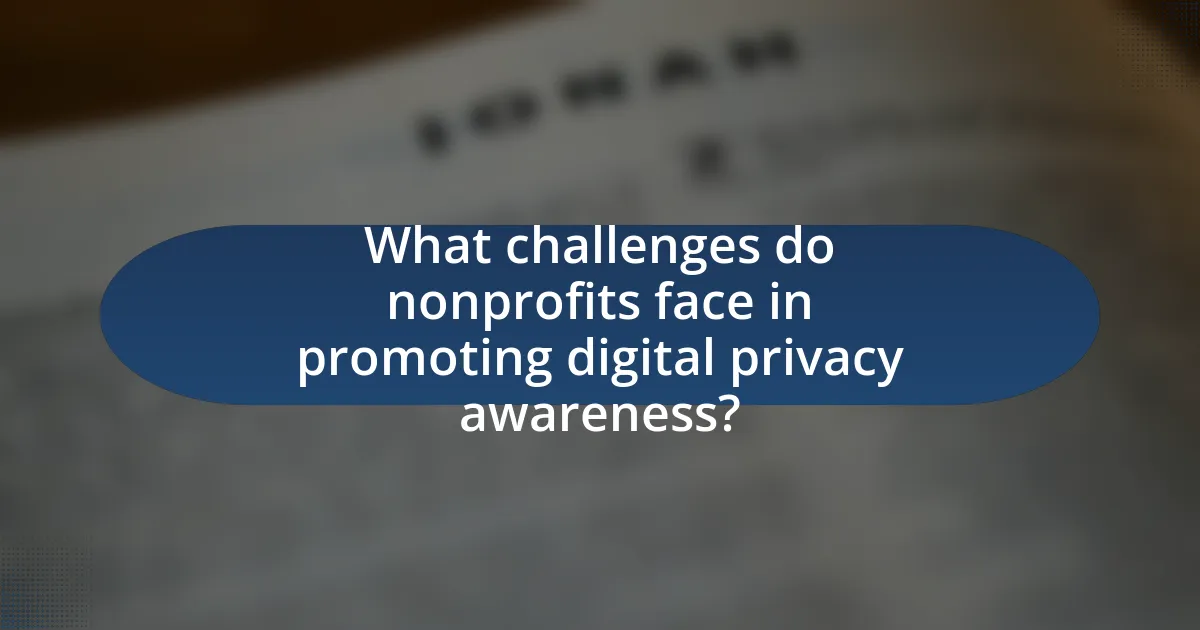
What challenges do nonprofits face in promoting digital privacy awareness?
Nonprofits face significant challenges in promoting digital privacy awareness, primarily due to limited resources and expertise. Many nonprofits operate on tight budgets, which restricts their ability to invest in comprehensive training programs or hire specialists in digital privacy. According to a 2021 report by the Nonprofit Technology Network, 70% of nonprofits lack dedicated staff for technology-related issues, making it difficult to effectively communicate complex privacy concepts to their audiences. Additionally, the rapidly evolving nature of digital privacy laws and technologies creates a knowledge gap, as nonprofits struggle to keep up with the latest developments and best practices. This lack of up-to-date information can hinder their ability to educate the public and advocate for stronger privacy protections.
How do funding limitations affect nonprofit initiatives for digital privacy?
Funding limitations significantly hinder nonprofit initiatives for digital privacy by restricting their ability to conduct research, develop educational programs, and implement advocacy efforts. Nonprofits often rely on grants and donations to finance projects aimed at raising awareness about digital privacy issues; without sufficient funding, they cannot effectively reach their target audiences or provide necessary resources. For instance, a report from the National Council of Nonprofits indicates that 70% of nonprofits cite funding as a major barrier to achieving their missions, which directly impacts their capacity to address critical issues like digital privacy. Consequently, limited financial resources can lead to reduced outreach, fewer educational materials, and diminished influence in policy discussions, ultimately compromising the effectiveness of nonprofit efforts in promoting digital privacy awareness.
What strategies can nonprofits employ to overcome funding challenges?
Nonprofits can employ diverse strategies to overcome funding challenges, including diversifying revenue streams, building strong relationships with donors, and leveraging technology for fundraising. Diversifying revenue streams allows nonprofits to reduce reliance on a single funding source, which can be critical during economic downturns; for instance, organizations can explore grants, individual donations, corporate sponsorships, and earned income through services or products. Building strong relationships with donors fosters trust and encourages long-term support; research indicates that nonprofits with engaged donor relationships see a 20% increase in funding over time. Additionally, leveraging technology, such as crowdfunding platforms and social media campaigns, can significantly enhance outreach and fundraising efforts, as evidenced by a 2021 report from the Nonprofit Finance Fund, which found that organizations utilizing digital tools raised 30% more than those that did not.
How do nonprofits address misinformation about digital privacy?
Nonprofits address misinformation about digital privacy by providing accurate information and resources to educate the public. They often conduct awareness campaigns, workshops, and seminars that focus on clarifying misconceptions surrounding digital privacy issues. For instance, organizations like the Electronic Frontier Foundation (EFF) offer comprehensive guides and toolkits that explain privacy rights and best practices for online safety. Additionally, nonprofits engage in advocacy efforts to influence policy changes that promote transparency and accountability in data handling by corporations. These initiatives are supported by research indicating that informed individuals are more likely to take proactive steps to protect their digital privacy, thereby reducing the impact of misinformation.
What are the future trends in nonprofit digital privacy awareness initiatives?
Future trends in nonprofit digital privacy awareness initiatives include increased collaboration with technology companies to develop user-friendly privacy tools and resources. Nonprofits are likely to focus on educating diverse communities about data protection rights, leveraging social media campaigns to reach wider audiences. Additionally, there will be a rise in partnerships with educational institutions to integrate digital privacy into curricula, ensuring that future generations are equipped with essential knowledge. According to a 2022 report by the Privacy Rights Clearinghouse, 70% of nonprofits plan to enhance their digital privacy training programs in response to growing concerns about data breaches and privacy violations.
How might technology advancements impact nonprofit strategies for digital privacy?
Technology advancements will significantly enhance nonprofit strategies for digital privacy by enabling more robust data protection measures and improving transparency. Nonprofits can leverage advanced encryption technologies, artificial intelligence, and blockchain to secure sensitive information and ensure compliance with privacy regulations. For instance, the implementation of AI-driven analytics can help nonprofits identify vulnerabilities in their data management systems, allowing them to proactively address potential privacy breaches. Additionally, advancements in blockchain technology can provide immutable records of data transactions, fostering trust among stakeholders. These strategies are essential as they align with increasing public demand for accountability and ethical data handling, as evidenced by the growing number of data privacy laws globally, such as the General Data Protection Regulation (GDPR) in Europe.
What emerging issues in digital privacy should nonprofits prepare for?
Nonprofits should prepare for emerging issues in digital privacy such as increased data regulation, cybersecurity threats, and the ethical use of artificial intelligence. Increased data regulation is driven by laws like the General Data Protection Regulation (GDPR) and the California Consumer Privacy Act (CCPA), which impose strict guidelines on data collection and user consent. Cybersecurity threats are escalating, with a report from Cybersecurity Ventures predicting that global cybercrime costs will reach $10.5 trillion annually by 2025, highlighting the need for nonprofits to bolster their data protection measures. Additionally, the ethical use of artificial intelligence raises concerns about bias and transparency, necessitating that nonprofits adopt responsible AI practices to protect user privacy.
What practical tips can nonprofits implement to enhance digital privacy awareness?
Nonprofits can enhance digital privacy awareness by implementing training programs for staff and volunteers focused on data protection practices. These programs should cover topics such as secure data handling, recognizing phishing attempts, and understanding privacy laws like GDPR and CCPA. Research indicates that organizations with regular training see a 70% reduction in data breaches, highlighting the effectiveness of education in fostering a culture of privacy. Additionally, nonprofits should develop clear privacy policies and communicate them transparently to stakeholders, ensuring that individuals understand how their data is used and protected. This transparency builds trust and encourages more individuals to engage with the organization while being aware of their digital rights.
How can nonprofits effectively measure the impact of their digital privacy programs?
Nonprofits can effectively measure the impact of their digital privacy programs by utilizing metrics such as user engagement, feedback surveys, and data protection compliance rates. These metrics provide quantifiable insights into how well the programs are educating users about digital privacy and ensuring their data is protected. For instance, tracking the increase in user participation in privacy workshops or the number of individuals who adopt recommended privacy practices can serve as direct indicators of program effectiveness. Additionally, analyzing changes in compliance rates with data protection regulations, such as GDPR or CCPA, can further validate the impact of these initiatives.
What best practices should nonprofits follow to engage their audience in digital privacy education?
Nonprofits should prioritize transparency, accessibility, and community involvement to effectively engage their audience in digital privacy education. Transparency involves clearly communicating how personal data is collected, used, and protected, which builds trust and encourages participation. Accessibility can be achieved by providing educational materials in various formats, such as videos, infographics, and workshops, catering to different learning preferences and literacy levels. Community involvement is crucial; nonprofits should collaborate with local organizations and stakeholders to tailor educational initiatives that resonate with the specific needs and concerns of their audience. Research indicates that organizations that actively involve their communities in educational efforts see higher engagement rates, as evidenced by a study from the Pew Research Center, which found that 70% of individuals are more likely to participate in initiatives that reflect their community’s values and needs.
